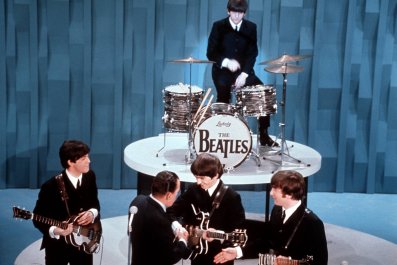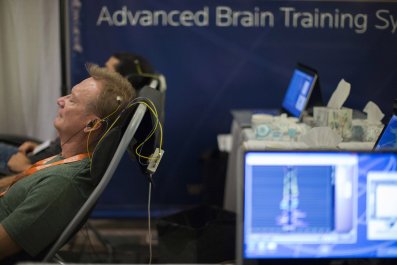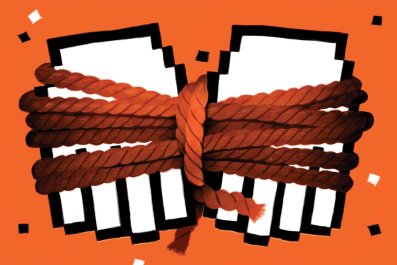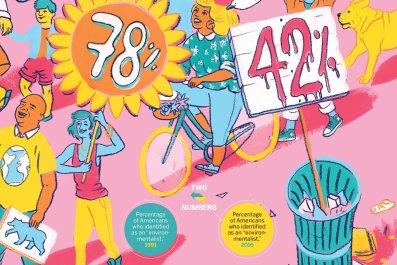
We've got two Americas now: Atoms America and Bits America.
People used to worry about a digital divide. Well, that's now looking more like the border between North Korea and South Korea—tense and bristling with pointed missiles, one nervous misunderstanding away from mayhem. This new dynamic is evident in everything from the transgender bathroom laws in the South to proposals from Silicon Valley to institute basic income for all the people technology is going to throw out of work.
And while we're at it, let's include the 2016 presidential election, which is really all about Atoms vs. Bits.
Twenty years ago, Nicholas Negroponte, then head of the MIT Media Lab, wrote about the changing relationship between atoms and bits in his book Being Digital. Atoms make up physical stuff. Bits are digital. As Negroponte presciently pointed out, atoms represent the old economy of manufacturing and trucks and retail stores and, as it turns out, a lot of middle-class work. Bits drive the new economy—which today includes mobile apps, social networks, artificial intelligence, cloud computing, 3-D printing and other technologies that are eating the old economy.
Atoms America is getting poorer and angrier. Bits America pretty much rules the global economy and churns out billionaires.
Atoms America wants to "make America great again" because reclaiming the past seems a hell of a lot better than whatever the future holds. Bits America patronizingly believes that the Atoms people would be fine, at least in the short run, if they would only take some Khan Academy courses and learn to code.
I saw this divide in real time in late April at a convention in San Diego called Lightfair International—the world's big lighting industry show. A decade ago, almost every exhibitor and attendee was a hands-on lighting designer or manufacturer—real Atoms people. They hailed from Cincinnati or Calgary or Germany, possibly doing the same work their parents did.
At the 2016 show, all the excitement had shifted to Internet of Things sensors in lights and all the data the devices will collect. A new generation of Silicon Valley computer jockeys roamed the floor, knowing they owned the industry's future. The Atoms people looked dazed. The air in the hall smelled of careers getting incinerated.
So Atoms America is pissed, and it has been giving the finger to Bits America—which is really what's behind the so-called bathroom laws passed in North Carolina and Mississippi. When people look backward for inspiration, they rebel against those who push forward.
But in Bits America, talent is everything, particularly in red-hot fields like data science and machine learning. No Bits America company can afford to drive away talent that happens to be gay or an immigrant, or even risk a hint of bias. Bits companies pretty much have to be progressive. So when conservatives running North Carolina passed a law that discriminates against the LGBT community, PayPal and Deutsche Bank canceled planned expansions there that would've brought in many Bits-oriented jobs. "We take our commitment to building inclusive work environments seriously," said Deutsche Bank co-CEO John Cryan at the time.

North Carolina is heavily Atoms. It needs more Bits. Instead, it decided to piss off Bits, creating a deeper chasm. Same thing happened in Mississippi and Indiana, two other states firmly in Atoms America. Seems like a trend.
The Bits are doing their part to be divisive jerks too. Right now, for instance, the Bits are sending the Atoms a very undiplomatic message about guaranteed basic income.
Maybe you've heard about this. Basic income movements have been around for decades, but the concept made headlines this year when Sam Altman, the influential chief of tech incubator Y Combinator, got behind it. In the current Silicon Valley version, basic income is rooted in the idea that Bits America is essentially going to wipe out Atoms America's jobs, and so we need to make sure the outmoded Atoms schlubs have enough money so they don't revolt. "We think there could be a possibility where 95 percent of people won't be able to contribute to the workforce," said Matt Krisiloff, who manages Y Combinator's basic income project. "We need to start preparing for that transformation."
Even if the notion of guaranteed income is well-intentioned, it sure sounds insulting to Atoms. It's the Bits saying to them, "Your contributions will be worthless and unmarketable, so don't even try to work. In fact, maybe don't even go to college and rack up all that debt and waste all that time studying hard stuff you'll never be able to use." In this version of the future, all careers end up with the structure of the NBA—a thin slice of superstars get megarich, another thin layer might eke out a living in minor leagues, and everybody else just plays for fun. But no paycheck.
Oh, and in case they didn't make it clear: The tech elite will be the NBA. No wonder the Atoms feel mounting anger at the Bits.
How do we know the Atoms are seething? Polls show that the single best predictor of a Donald Trump supporter in the GOP primaries is the absence of a college degree—the kinds of people already seeing their jobs automated away by software. His supporters tend to say they feel resentful and powerless. They feel screwed by Bits America. Voting for Trump is how they show it.
To Bits America, Trump's protectionist, isolationist messages are those bathroom laws writ large. His ideas are a threat to the Bits' juggernaut. Turn away talented immigrant geeks? Make Apple manufacture every iPhone in the U.S.? Start trade wars that might lock Google or some coming cloud-based machine-learning technology out of global markets? Whoa—that's disruptive, dude.
Again, the digital divide is not new. A White House report in 2015 concluded that it "is concentrated among older, less educated, and less affluent populations, as well as in rural parts of the country that tend to have fewer choices and slower [internet] connections." Just a year ago, Atoms America and Bits America seemed to be split in ways that were mostly tangible—technology access, age, geography.
Now the divide seems to be ideological. Atoms and Bits are choosing sides and getting ready to fight. If that doesn't change—if our leaders can't get us past that—somebody's going to launch a missile.


















